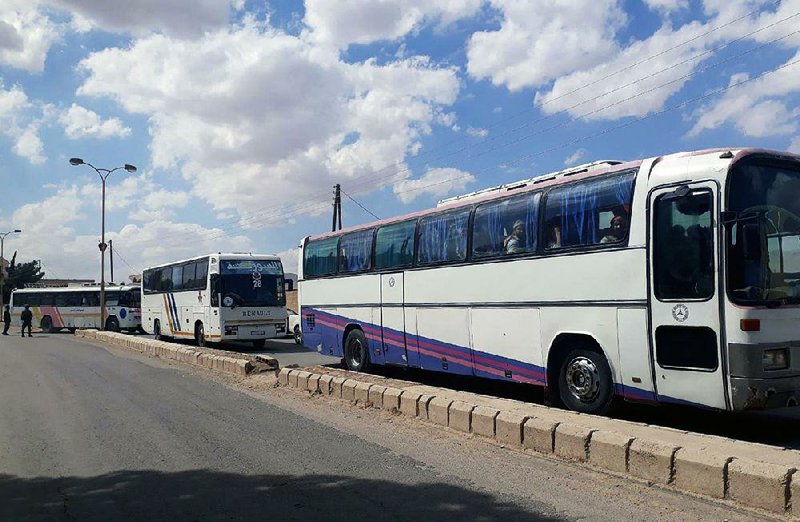BEIRUT -- Weapons inspectors on Saturday entered the Syrian city of Douma, where a suspected poison gas attack two weeks earlier killed at least 43 people and prompted U.S.-led airstrikes against Syrian military facilities.
After a week of delays, the Organization for the Prohibition of Chemical Weapons said it had visited one of two alleged blast sites in the city to collect samples that will now be analyzed in the Netherlands.
In a statement, the organization said it would consider a second visit to Douma, where residents and doctors present on the night of the April 7 attack have said that the air filled with the smell of chlorine. Video footage and eyewitness testimonies suggest that some of the victims died foaming at the mouth, a symptom that could indicate exposure to a nerve agent.
The United States, France and the United Kingdom responded to the attack with airstrikes on facilities linked to Syrian President Bashar Assad's chemical weapons program and demanded an immediate independent investigation into what caused such a high number of deaths in Douma.
But rather than head straight for the site, the Organization for the Prohibition of Chemical Weapons team was forced to sit in Damascus for much of the past week, leading the United States and France to accuse Syria and its Russian allies of attempting to delay the inspection as they sanitized the alleged blast sites.
On Thursday, French Foreign Minister Jean-Yves Le Drian blamed the time lapse on "obstructionism" by Syrian and Russian authorities who control the site and said it was intended to undermine the caliber of the investigation.
Russia, which controls much of the city through its military police, rejected that accusation Saturday. "We are calling on our Western colleagues to come to reason and refrain from actions that obstruct the establishment of the truth about the April 7 provocation," Foreign Ministry spokesman Maria Zakharova said in a statement.
She said Moscow expected an "impartial investigation" and a "prompt release of an objective report."
Russia has rejected earlier international probes into the use of chemical weapons by Assad's military, including one by the United Nations last year that accused the Syrian army of killing more than 80 people when it dropped a nerve agent on the northern town of Khan Sheikhoun in the early hours of April 4, 2017.
The nature of the chemical weapons reportedly used in Douma remains unclear, and open-source video and photographic evidence has appeared to suggest that one may have involved a more toxic mix than the others.
Abou Salah entered one of the buildings affected by the alleged gas attack the next day and took footage of a yellow cylinder with a gas valve on the top floor. He said it had crashed through the roof and showed a gash in the ceiling where it purportedly came through.
His assertions could not be independently verified. But the cylinder looked like others identified by the international nongovernmental organization Human Rights Watch at other locations of chlorine gas attacks attributed to the government in 2016.
The inspectors' report is highly anticipated, for despite reports of the deaths from Douma, Syrian and Russian state television have aired testimonies from area doctors and victims denying that a chemical attack took place.
Area residents, interviewed on condition of anonymity out of concerns for their safety, said the interviewees had been coerced into giving false statements.
[THE ISLAMIC STATE: Timeline of group’s rise, fall; details on campaign to fight it]
Experts have warned that the Organization for the Prohibition of Chemical Weapons inspectors face an uphill challenge. Chlorine is a gas at room temperature and therefore unlikely to remain at the scene, experts say, while traces of nerve agent are likely to fade fast. It is also hard to draw firm conclusions from traces of chlorine found in biomedical samples because the substance occurs naturally in the body.
Residents said Russian military police and Syrian soldiers have blocked off and entered the two locations of the alleged chemical attacks on multiple occasions since they recaptured the area from rebel forces in the wake of the April 7 strikes.
Thousands of people -- rebels and civilians -- left Douma on buses to north Syria in the days after the attack, believing they could not live under government authority after it retook the town. North Syria is divided between opposition, Turkish, and al-Qaida control.
On Saturday, rebels began evacuating three towns in the eastern Qalamoun region in the Damascus countryside, state TV reported.
State-run Al-Ikhbariya TV said 35 buses left the towns of Ruhaiba, Jayroud, and al-Nasriya carrying hundreds of rebels and their families to opposition territory in north Syria.
The station said there could be 3,200 rebels leaving three towns on Saturday. It said the evacuations would continue for three days.
Syrian government forces will take over the towns once the departures are complete.
Information for this article was contributed by Louisa Loveluck and Amie Ferris-Rotman of The Washington Post; and by Philip Issa, Michael Corder and James Heintz of The Associated Press.
A Section on 04/22/2018

